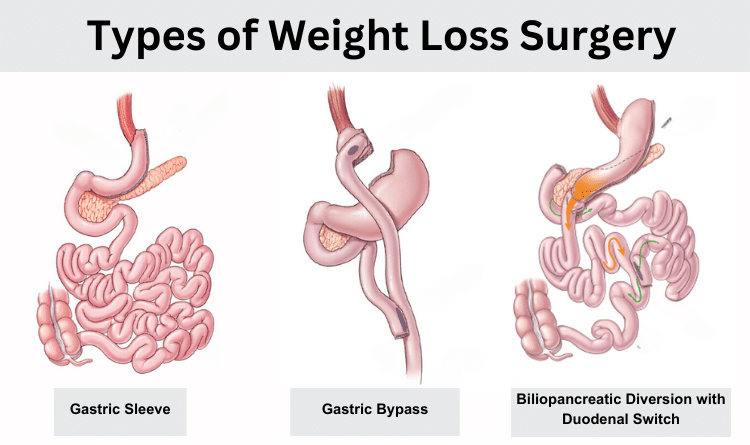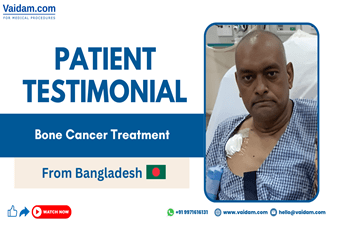
Are you dealing with severe obesity and cannot lose weight even after trying all the natural remedies? Are you the one who keeps on reducing dietary intake and also follows a strict exercise regimen but is still unable to lose that extra fat? Maybe it's time for you to explore surgical options like bariatric or weight loss surgery.
Bariatric surgery helps you reduce the risk of many life-threatening weight-related disorders such as non-alcoholic fatty liver, hypertension, type 2 diabetes mellitus, and cardiovascular diseases.
Bariatric surgery offers many benefits, but you must recognize that it is a major surgery and can pose many risks. Therefore, selecting the best hospital with skilled surgeons is necessary to get the results you always wanted. Bariatric surgery hospitals in India, Turkey, Thailand, Germany, and the UAE have the latest medical technologies and best-in-class facilities.
Get in Touch with Medical Experts
What is Bariatric Surgery?
It can be frustrating if you have tried every natural way of losing weight, like eating healthy food and regular exercise, but still cannot shed those extra kilos. That's where bariatric or weight loss surgeries come into play.
Bariatric surgeries are specialized surgeries designed to limit the amount of food you intake and the nutrients you absorb. Weight loss surgeries can help you lose up to 80% of your body weight.
Weight loss surgeries are a part of laparoscopic surgeries. They are now being done using minimally invasive techniques, offering smaller incisions and a faster recovery.
What are the Potential Benefits of Weight Loss Surgery?

Weight loss surgeries offer various advantages. These surgeries help prevent, slow the progression, or even reverse some of the chronic conditions associated with obesity, such as:
- Obstructive Sleep Apnea: In obstructive sleep apnea, the breathing pauses while you are sleeping. As a result, a low amount of oxygen reaches the vital organs, such as the heart.
- Coronary Artery Disease (CAD): Obesity causes plaque buildup in the coronary arteries, reducing the blood supply to heart muscles. Myocardial infarction and angina are often results of CAD.
- Type 2 Diabetes Mellitus: If you are overweight or obese, your body will store excess fat. The extra fat deposits can cause insulin resistance and eventually type 2 diabetes.
- Joint Diseases: The chances of developing degenerative bone conditions like osteoarthritis increase with increased body weight.
- GERD is a digestive disease in which the stomach contents travel backward into the esophagus from the stomach. The condition can be managed by reducing weight.
- Chronic Back Pain: As the body weight increases, the pressure on the spine also increases. This can lead to chronic and persistent back pain.
- Hypertension: High blood pressure is a severe threat to the heart, often leading to stroke and heart attacks. Managing weight helps in lowering the blood pressure.
- Fatty Liver: Non-alcoholic fatty liver is a significant complication of obesity and weight-related disorders. Fatty liver can cause irreversible damage to the liver, making it a serious chronic disease.
- Hyperlipidemia: Obesity increases the amount of cholesterol in the blood. This causes fat buildup in the arteries or atherosclerosis, which increases the risk of stroke or heart attack.
Apart from losing weight and treating the conditions mentioned above, bariatric surgery also improves your ability to do daily activities.
Sounds fascinating, right? But there's a catch. Only some qualify as a candidate for the surgery. Read further to know if you are a candidate for weight loss surgery.
Who is a Good Candidate for Bariatric or Weight Loss Surgery?
Bariatric surgeries are not for everyone. There are certain medical conditions that you need to fulfill before being selected for the surgery.
An obesity and bariatric surgeon will do a complete screening of your profile and help you select the best possible option for you. Various renowned bariatric surgeons in India, Germany, Turkey, Thailand, and UAE offer excellent results for weight loss surgeries.
Generally, bariatric surgery is recommended for people who are:
- Severely obese: If you have a BMI of 40 and above, you are a good candidate for weight loss surgery.
- Obese and suffering from chronic diseases: If your Body Mass Index (BMI) ranges from 35 to 40 and you also suffer from hypertension, type 2 diabetes, or sleep apnea, you can be a candidate for the surgery.
Bariatric surgery might still be an option if your BMI is under 35, provided you suffer from serious weight-related disorders.
What are the Different Types of Weight Loss Surgery?

Bariatric surgeries can be performed in multiple ways. Your treating physician will select the kind of weight loss surgery you’ll receive.
The main types of bariatric surgery are:
Gastric Sleeve
- A gastric sleeve or sleeve gastrectomy removes around 80% of the stomach.
- The procedure involves removing a large part of the stomach and stapling the remaining organ.
- The new stomach is shaped like a banana and holds less food.
- The section of the stomach secreting the hunger hormone is mainly removed, thus decreasing hunger.
- It is a relatively simple surgery without any involvement of the intestine.
- Advantages of the surgery include:
- Short surgery time
- Effective weight loss
- A bridge between gastric bypass
- Improve obesity-related conditions
Watch the video of Mrs. Eva, a 44-year-old Angola resident, sharing her experience of gastric sleeve surgery in Turkey.
Gastric Bypass
- Gastric bypass has been carried out as a laparoscopic surgery since 1993.
- The weight loss surgery is also known as Roux-en-Y Gastric Bypass, which is a French term that means in the form of Y.
- The surgery involves three steps:
- First, the bariatric surgeon creates a small pouch of the stomach and separates it from the rest of the stomach. The larger part of the stomach can no longer hold the food.
- The second step involves dividing the small intestine into two parts. The lower part is connected to the newly created stomach pouch that helps food bypass most of the stomach and intestine.
- The final step involves connecting the bypassed stomach to the small intestine 3 to 4 feet down. This connection is in the shape of Y.
- As the size of the stomach decreases, its capacity to hold food also decreases. This eventually helps you ingest fewer calories.
- Since the food does not come in contact with most of the small intestine, the absorption also decreases to a great extent.
- It is a standardized technique that provides long-lasting weight loss.
Biliopancreatic Diversion with Duodenal Switch
- Abbreviated as BPD-DS, the Biliopancreatic Diversion with Duodenal Switch is similar to gastric sleeve and gastric bypass.
- Just like sleeve gastrectomy, the BPD-DS involves making a sleeve-like stomach that is smaller in size.
- The next step involves detaching the first part of the small intestine from the stomach.
- A part of the small intestine is then attached to the newly created stomach pouch, enabling the food to pass directly from the sleeve pouch into the last part of the intestine.
- The surgery has one of the best results for obesity management as it bypasses roughly 75% of the small intestine.
- With the small intestine bypass, there is a significant reduction in hunger hormones.
- However, such an extensive surgery increases your chances of getting malnourished. Regularly taking vitamins and mineral supplements after the BPD-DS surgery is advisable.
What are the Risks of Bariatric or Weight Loss Surgery?
You must remember no surgery exists without possible complications. Common surgical risks in bariatric surgery include bleeding, blood clots, infections, hernias, and small bowel obstruction.
Weight loss surgeries can potentially cause postgastrectomy syndromes such as:
- Dumping Syndrome
- Malabsorption
- Malnutrition
- Bile Reflux
- Gallstones
What is the Cost of Weight Loss Surgery?
The cost of bariatric surgery depends on multiple factors like the type of surgery you undergo, the hospital and room you select, total duration of stay, post-operative care, etc.
The price of different bariatric surgeries in various countries is given below.
| Surgery | India | Thailand | Turkey | Germany |
| Gastric Sleeve | ||||
| Gastric Bypass | ||||
| BPD-DS |
Takeaway
Weight loss surgeries have emerged as a boon for obese people and those likely to develop chronic diseases due to the disease. The most common weight loss or bariatric surgeries are gastric bypass, biliopancreatic diversion with a duodenal switch, and sleeve gastrectomy or gastric sleeve. These surgeries help you prevent many other conditions linked to obesity, like hypertension, diabetes, cardiovascular diseases, osteoarthritis, sleep apnea, and kidney diseases.





































